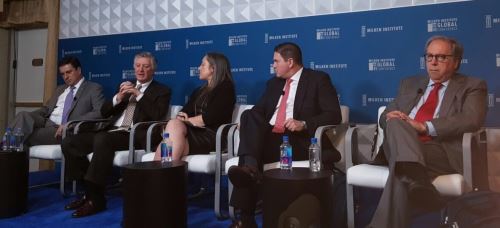The Global Conference convened the best minds in the world to tackle the most complex challenges.
The commitment to the power of ideas has set this event apart for two decades. It is a unique setting in which the individuals with capital, power and influence —required to move the world forward— meet face-to-face with those whose expertise and creativity are reinventing industry, philanthropy and media.
"For us, as a country interested in pursuing openness in trade and sound commercial policies with the most dynamic economies in the world, and as members of the Pacific Alliance, it was crucial to be able to communicate our common strategies and interests with key players gathered at this conference," Peruvian Ambassador to Washington D.C. Carlos Pareja expressed.
The panel was moderated by Julie T. Katzman, Executive Vice President and Chief Operating Officer of the Inter-American Development Bank. The other panelists were Ambassadors to the United States: Gerónimo Gutiérrez (Mexico), Juan Carlos Pinzón (Colombia) and Juan Gabriel Valdés (Chile).
"The sum of many factors like economic modernization, natural resource abundance and continued improvements in economic governance and political stability are helping Peru emerge as one of the most stable and influential countries in Latin America," said Pareja during his presentation.
The Pacific Alliance
The Pacific Alliance is an integrated, regional trading bloc made up of Chile, Colombia, Mexico and Peru. These countries share a population of 217 million with a combined average GDP per capita of $16,759 in purchasing power parity.
The alliance provides opportunities for foreign investments as its members move towards the free movement of goods, services, resources and people.
The four members negotiated a common free trade agreement, which entered into force on May 1, 2016. It aims to regulate rules of origin, customs administration and trade facilitation, technical barriers to trade, government procurement, investment, intellectual property, sanitary and phytosanitary measures, labor, environment and transparency.
"The Pacific Alliance is an ambitious platform that also deals with the facilitation of free movement of people under a visa waiver program and an integrated migration system for the immediate exchange of information," the Peruvian diplomat added.

Conference
The 20th Annual Milken Institute Global Conference was devoted to discussing "How to Build Meaningful Lives" and organized by the Milken Institute, a non-profit, nonpartisan think tank determined to increase global prosperity by advancing collaborative solutions that widen access to capital, create jobs and improve health. The institute is based in Santa Monica, California.